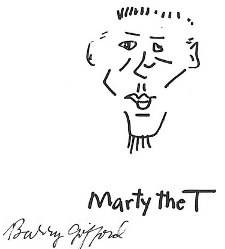EXCLUSIVE: The Trumpet — A New Christmas Story from Barry Gifford
By Rob Christopher in Arts & Entertainment on Dec 15, 2011 5:00PM
 [Everyone seems to be knocking snail mail these days. That's a pity. Because in addition to Amazon packages and Christmas cards, you never know what goodies might show up in your mailbox this time of year. Such was the case last week when we received a thick envelope postmarked from Berkeley, CA. We opened it up and inside was a brand new Christmas story from Barry Gifford. The Chicago native (and prolific storyteller) gave us "The Starving Dogs of Little Croatia" a few years ago, and his new story "The Trumpet" further chronicles the adventures of Roy, a kid growing up on the gritty streets of yesteryear Chicago.
[Everyone seems to be knocking snail mail these days. That's a pity. Because in addition to Amazon packages and Christmas cards, you never know what goodies might show up in your mailbox this time of year. Such was the case last week when we received a thick envelope postmarked from Berkeley, CA. We opened it up and inside was a brand new Christmas story from Barry Gifford. The Chicago native (and prolific storyteller) gave us "The Starving Dogs of Little Croatia" a few years ago, and his new story "The Trumpet" further chronicles the adventures of Roy, a kid growing up on the gritty streets of yesteryear Chicago.
You can read more Chicago tales in Gifford's recent book Sad Stories of the Death of Kings. But right now cast yourself back to the year of 1962, when a mayor named Daley still had a desk at City Hall and South Wabash was home to Music Row.]
__________________________________________________________________________________________
by Barry Gifford

Photo by Art Shay
It was a drizzly, early December afternoon in 1962 when the station was robbed by two men wearing bandana masks, one red, one black. Marty the T was working on Dizzy Gillespie’s tune “Con Alma” when a gray and blue 1959 Chevrolet Impala pulled up to one of the pumps. T noticed the car out of the corner of his left eye, played a few more notes and put down his trumpet. By the time he’d stood up and begun to head out the office door, the two men were walking quickly toward him. Both of them were of average height and weight and carried guns in their right hands, which they held at their sides, not pointed at T. They wore dark brown Fedoras and black car coats and were inside the office before Marty the T could do anything. As soon as T saw the guns, he put up his hands.
“Open the register,” ordered one of the men.
Marty the T hit the "No Sale" key on the 1920 National and the cash drawer slid out. The man who had not yet spoken elbowed T out of the way, removed all of the bills and stuffed them into a pocket of his coat, then took out the drawer and dropped it. Coins scattered all over the room even before the drawer hit the floor. The man scooped out the larger bills, tens and twenties, that had been hidden underneath and crammed them into the same pocket. The other man said, “Show us the safe.”
“There isn’t one,” said T.
“Where’s the old man?” asked the bandit who had cleaned out the register.
“In the garage.”
That man left the office; the other one stood still and kept his eyes on Marty the T. T noticed that they were blue; the other man’s eyes were brown but T didn’t really look at them until the man returned to the office marching old man Poznanski in front of him.
"The boy’s tellin’ the truth,” Poznanski said, “there’s no safe.”
"Get on the floor, both of you,” said the man who’d herded Poznanski. “Face down.”
"Close your eyes and stay put,” said the other man.
Poznanski and Marty the T did what they were told. The robbers took a fast look around the office, one of them kicked over a waste basket that was next to the desk, then they left. Marty the T and old man Poznanski stayed down until they’d heard the men open and close the doors of their car, the engine start and the car pull away.
Poznanski stood up first, looked out the door and said, “It’s okay, Marty, they’re gone.”
T got up and looked out.
“We’re pretty lucky, I guess,” said the old man. “They didn’t shoot us, they only took the cash.”
“No,” said T, “they took my trumpet, too.”
Poznanski looked at the top of the desk, which was where Marty the T always put the trumpet down when he left the office to pump gas.
“They’ll pawn it for two bucks,” he said.
When Roy and his friends found out that the thieves had stolen Marty the T’s instrument they chipped in and gave T nineteen dollars and seventy-five cents.
“That’s great of you guys,” he said. “Old man Poznanski gave me ten. Now I can buy a better horn than the one I had.”
The next morning, Marty the T bought a used trumpet at Frank’s Drum Shop on Wabash Avenue for thirty bucks. He was playing it in the office at the Sinclair station three days before Christmas when the police called and told old man Poznanski they had found the ‘59 Impala that had been used in the hold-up abandoned in an empty lot on Stony Island Avenue. It had been stolen, then dumped. Marty the T’s trumpet was on the back seat.
T went down to the precinct house across the street from City Hall to claim it. Roy and Tommy Cunningham went with him. When the claims officer handed the trumpet over to T, he laughed and said, “Look what they done to it.”
The bell had been bent up at a forty-five degree angle.
“This is how Dizzy’s horn looks,” said Marty the T. “Whichever one of the stick-up men did it must know that.”
“Can you still play it?” asked Cunningham.
Marty the T put the trumpet to his lips and squeaked out a few notes.
“No trumpet playin’ in here,” barked the claims officer.
“That’s the intro to ‘Night in Tunisia,’” T told him.
“Yeah, well, it’s late afternoon in Chicago,” said the cop. “Take it outside.”
Years later, when Roy saw Dizzy Gillespie perform in a nightclub in New York, he told this story to the people he was with.
“Did Marty the T become a professional musician?” asked one of them.
“I don’t know,” said Roy. “I never saw him again after I graduated from high school and left the neighborhood. But Tommy Cunningham told me he heard that T had married a girl from Africa named Happiness Onsunde. I said that would be a good title for a song, ‘Happiness on Sunday,’ and Cunningham reminded me that Marty the T told us when we were outside the police station that he was going to write a tune called ‘Late Afternoon in Chicago,’ and send it to Dizzy.”